“I was worried about my cousins getting killed,” Kevin Sullivan, Project Director for the Ad Hoc Committee to Protect the Good Friday Agreement said. “My mother was born in Sixmilecross, County Tyrone. My father was a career Army officer, and we lived abroad quite a bit. I often went back to my mother’s home place. I saw when the violence began and felt my own family was at risk, so my long-time involvement in the peace process in Northern Ireland over the decades was, and is, personal.”
We were standing on the ground floor of gigantic, packed-to-the-rafters Whitla Hall, Queen’s University Belfast during the extraordinary “days of wonder,” April 17-19, 2023 when Agreement 25 took place. The conference marked a quarter century since, against all the odds, the Good Friday/Belfast Agreement, which brought peace to Northern Ireland, was signed by all parties.
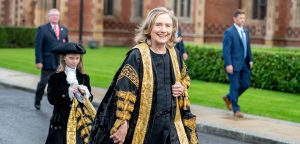
Secretary Hillary Rodham Clinton, the first woman chancellor of the University in its nearly 200-year history, was presiding over the extraordinary gathering. “I am proud to host this conference, which brings together civic leaders who have contributed to Peace and Reconciliation in Northern Ireland,” she stated.
Sullivan was attending along with more than a dozen members of the group, which had been formally organized in 2019. Led by co-chairmen former Congressmen Bruce Morrison, Democrat and Jim Walsh, Republican, the Ad Hoc Committee consists of former Governors, members of Congress and the Diplomatic Corps, academics, leaders of Irish-American organizations, and prominent Irish-Americans who had all worked during their careers for peace in Northern Ireland. They had become alarmed when Brexit and negotiations on the Northern Ireland Protocol seemed to threaten the Agreement. “We were deeply concerned,” Sullivan says, “about the possibility of a hard border, or even a return to violence.”
The Ad Hoc Committee member and conference attendee Ted Smyth is a former Irish Diplomat and President of the Advisory Board at Glucksman Ireland House, NYU. His involvement in the peace process began in 1976. Speaking during a break in the proceedings, Smyth said:
As a young member of the Irish Department of Foreign Affairs, I met John and Pat Hume in Derry in 1976. I was impressed as was everyone with their commitment to peace. John had such a clear sense of the framework that could end the conflict and how to achieve real change through non-violence. Pat’s warmth, and empathy created a zone of comfort during very troubled times.
I was so pleased when soon after meeting them I was assigned to the Irish embassy in Washington. My colleague Michael Lillis and I begin working to introduce John and his message to the United States, especially to members of Congress and the Carter administration. John’s eloquence and persistence brought him allies – first the four horsemen: Senators Ted Kennedy and Patrick Moynihan, Speaker of the House Tip O’Neill and New York Governor Hugh Carey – and then President Jimmy Carter who became the first U.S. President to speak out for the human rights of the minority in Northern Ireland.
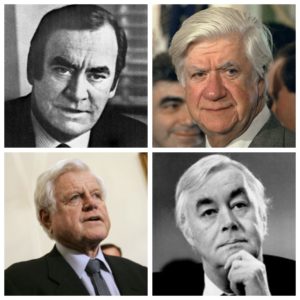
The U.S. government promised significant economic aid if the conflict could be moved into the political sphere. This displeased the British government which always maintained that Northern Ireland was an internal affair and resented any U.S. government interference. This changed. The presence of former British Prime Minister Tony Blair, former U.S. president Bill Clinton, and former Irish Taoiseach Bertie Ahearn here today is evidence of how the three governments worked together.
It’s very important to underline what Sen. George Mitchell said in his keynote address when he pointed out that The Agreement is a great example to the world of resolving conflict. He emphasized that we can’t be what he called 100 percenters. We have to compromise. Compromise is strength and courage. He said that there would have been no peace process without John Hume, but no peace agreement without David Trimble. Both men compromised in order to find common ground.
Smyth said that the members of the committee were attending Agreement 25 “to learn, to listen, to show our commitment to the Good Friday Agreement. Our committee is open to all parties. We don’t support any particular party. We’re not partisan in the United States, nor here. We welcome conversations. We want people here to feel that the US is the friend of everyone.”
The Committee, now grown to 80 members, will continue to meet with political, civic, business, and community leaders as well as Irish and British Diplomats and key members of the National Security Council of the US State Department. They will offer support and advice, and keep – as Ted Smyth said – listening.
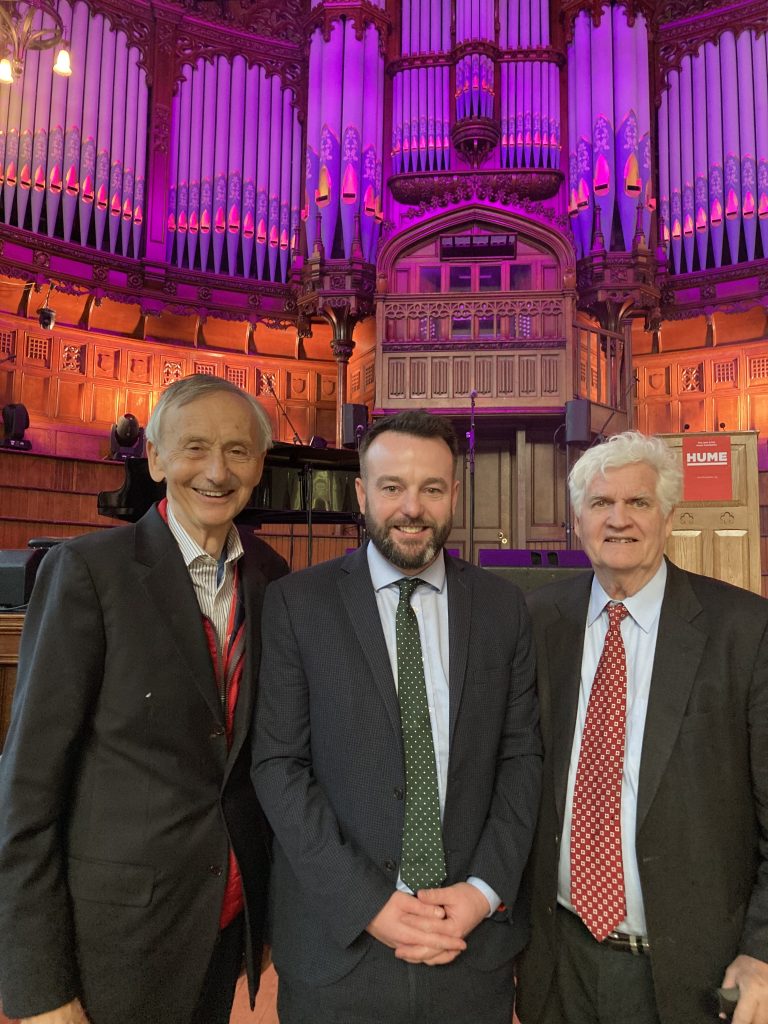
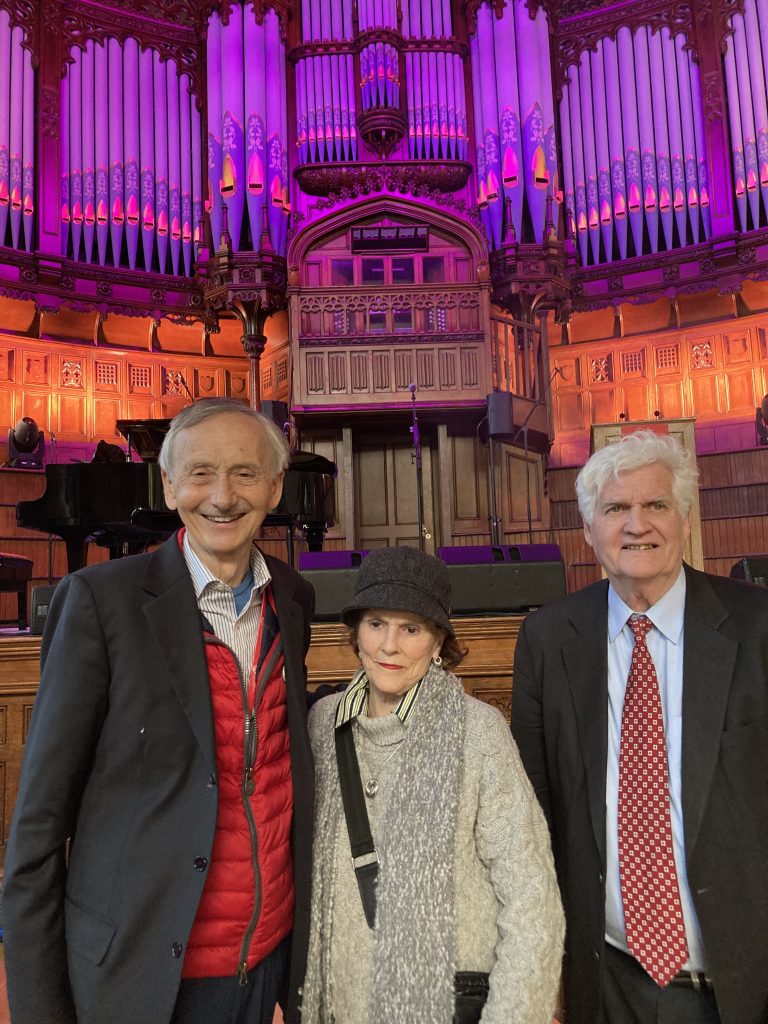
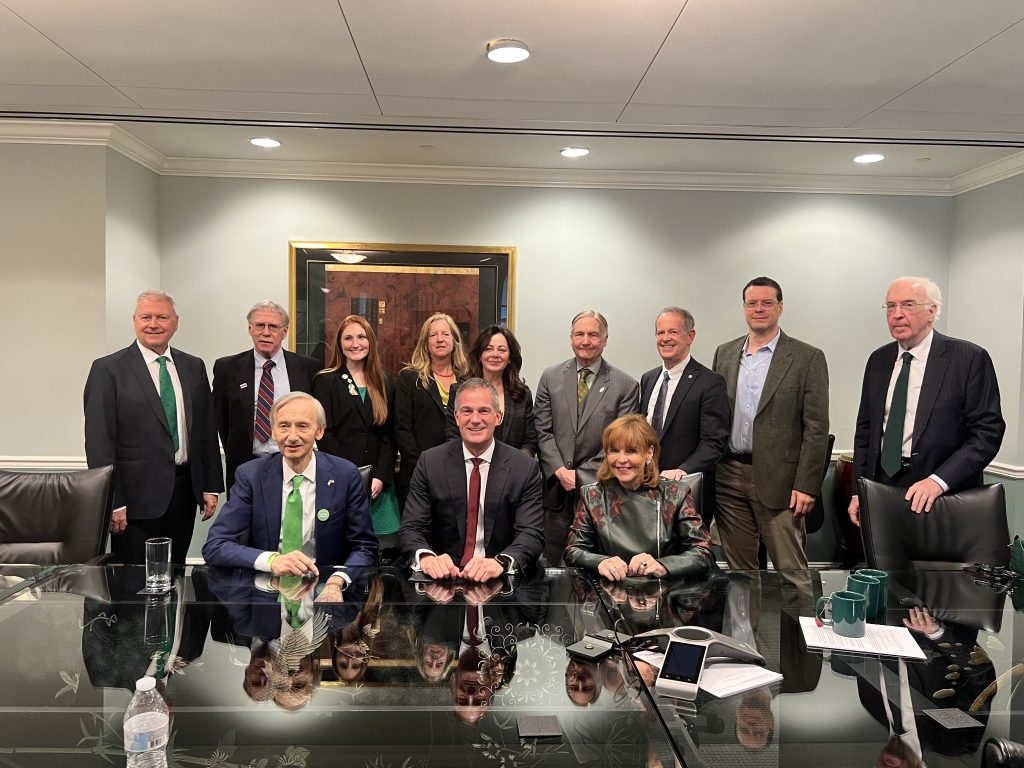
Former members of the Diplomatic Corps
Paula Dobriansky, Mitchell Reiss, Ambassador Nancy Soderberg, Ambassador Susan Elliott, Ambassador Melanne Verveer, Ambassador Kevin O’Malley, Ambassador Elizabeth Bagley, and Ambassador Michael O’Sullivan
Former members of Ad Hoc now in the Biden Administration
Jake Sullivan, Carmel Martin, John McCarthy, Tom Wright
Former Governors and Members of Congress
Senator Chris Dodd, Senator Gary Hart, Governor Martin O’Malley, Governor Terry McAuliffe, Cong. Joe Crowley, Cong. Pete King and Cong. Joe Kennedy III
Academics
Prof. Bonnie Weir, Prof. Kimberly Cowell Meyers, Prof. Carol Gallaher, Prof. Robert Savage, Prof. Brendan O’Leary, Prof. Cóilín Parsons, Prof. Martin Flaherty, Prof. John Feerick, Prof. John Rogan, Prof. Michael Martin, Prof. Patrick Griffin, Jacqueline M. Nolan-Haley
Irish American Organizations
Danny O’Connell, Dan Dennehy, Martin Galvin, Sean Pender, Chief Judge James F. McKay, Karen Keane, Neil Cosgrave, Stella O’Leary, Peter Kissel, Jennifer Frankola, Chris Fitzgerald, Domhnall O’Cathain
Prominent Irish Americans
Hilary Bierne, John Fitzpatrick, Loretta Brennan Glucksman, Susan O’Neill, Mike O’Neil, Mark Tuohey, Billy Lawless, Mike McCurry, Richard Riley, Kathleen Kennedy Townsend Brian O’Dwyer, Paul Quinn, John Connorton, Kitty Higgins, Susan Davis, Rosemary O’NeillCarol Wheeler, James B. Hayes, James Boland, Kristen Leary, Noreen Bowden, Harry Hartford, Robert Emmett “Bobby” Cunningham, William McKiernan, Ted Smyth, William Tranghese, Jim Gaffey, Tom Kehoe
Follow the committee on Twitter at @HocGfa. ♦

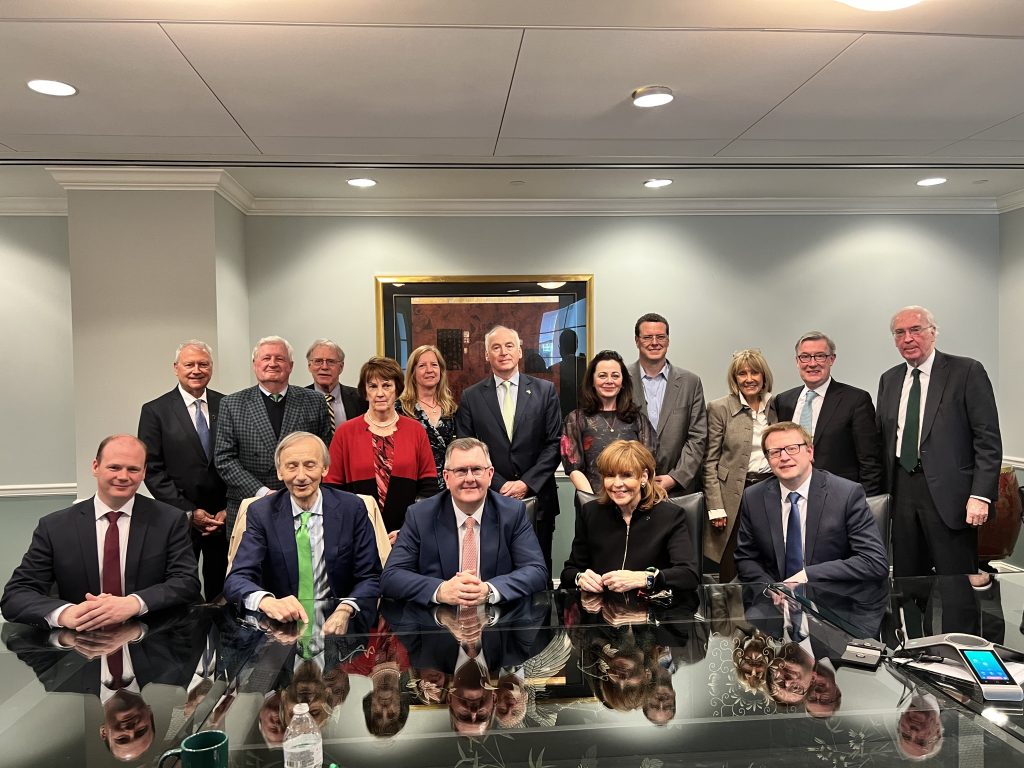
Failure is an orphan … and success rightfully has many parents. Among those rightfully celebrated as “parenting” the Good Friday Agreement, there were three whose names were noted by their absence. Bill Flynn and Tom Moran of Mutual of America for unending “behind the scenes” support never sought recognition knowing that their anonymity and trustworthiness were enhanced by never receiving any credit. Professor Patrick (Paddy) Johnston crafted and led the All Ireland Cancer Coalition that embraced the island of Ireland and the US National Cancer Institute. Science-driven, Paddy, also created at Queen’s University-Belfast a now globally statured cancer research and patient treatment center of excellence that bears his name after his untimely and lamented death.